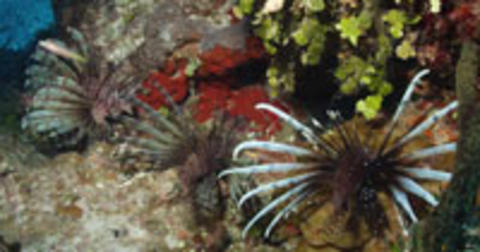Working with leading scientists, REEF's lionfish field work is paying off in valuable information needed to address this key issue. Information from the five Bahamas projects conducted thus far this year is being used to help determine the range and extent of the lionfish invasion, as well as to address key questions on age/ growth, reproduction, genetics, parasites and habitat preference.
Current search
Search found 714 items
- lionfish
This popular trip returns in 2012 for the third year in a row. Reserve your space now, it will fill up quick.
$1995 - $2195 per person (depending on cabin type, double occupancy. Includes seven nights on board the Sun Dancer II, all meals and beverages (including well brands of alcohol and Belikin beer), transfers from/to Belize International Airport, five and ½ days of diving up to five dives per day, other standard Dancer Fleet services and amenities.
Join us from 6:30pm-8:30pm at Divers Direct in Dania Beach on June 5th for a lionfish collecting and handling workshop. Topics will include background of the invasion, biology/ecology of lionfish, impacts of lionfish and current research findings as well as collecting and handling tools and techniques. Participants will also have the opportunity to obtain their permit for collecting lionfish within the Florida Keys National Marine Sanctuary no-take zones (SPAs). Please note, there is no dive associated with this workshop.
Frequent culling of the invasive Indo-Pacific Lionfish throughout the Caribbean has been shown to cause a shift towards more wary and reclusive behaviour by lionfish, which has prompted calls for halting culls. This paper, co-authored by REEF Lionfish Program researchers, addresses those concerns and reviews research conducted by REEF and other research efforts. Culling successfully lowers lionfish numbers and has been shown to stabilise or even reverse declines in native prey fish.
REEF Lionfish Jewelry Workshops create a market to promote lionfish removal from our coral reefs. Through participation in this workshop, you are helping to keep our oceans healthy, vibrant and lionfish free! Workshops are $30, run from 7-9pm, and include materials, instruction, wine or beer, cookies and a REEF glass.
For more information and to find out about how to reserve your spot, please visist our lionfish jewelry workshop page.
Managing invasive Indo-Pacific lionfish (Pterois volitans and P. miles) in the Western Atlantic Ocean is beyond the capacity of natural resource organizations alone. In response, organizations have mobilized members of the public and citizen scientists to help. The authors used a structured survey to assess the activities and perceptions of 71 organizations that engage the public and citizen scientists in lionfish research and management throughout the invaded range of the Western Atlantic.
Join REEF in a special presentation on the background of the lionfish invasion, biology and ecology of lionfish, impacts of the lionfish and current research findings as well collecting and handling tools and techniques. After attending the Saturday morning workshop, each participant is welcome to attend optional lionfish handling dives on Saturday afternoon and Sunday morning.
In this early paper, staff from REEF and NOAA studied feeding ecology of the invasive lionfish (Pterois volitans). The authors collected stomach content data from fishes taken throughout the Bahamian archipelago. Three relative metrics of prey quantity, including percent number, percent frequency, and percent volume, were used to compare three indices of dietary importance. Lionfish largely prey upon teleosts (78% volume) and crustaceans (14% volume).
Join REEF in a special presentation on the background of the lionfish invasion, biology and ecology of lionfish, impacts of the lionfish and current research findings as well collecting and handling tools and techniques. After attending the Saturday morning workshop, each participant is welcome to attend optional lionfish handling dives on Saturday afternoon and Sunday morning.
REEF is offering a lionfish workshop on June 15th at the Key Largo Library from 6:30 to about 8:00. All workshop participants will be eligible for a federal permit to collect lionfish, with nets or slurguns, from the no-take zones, the Sanctuary Preservation Areas (SPAs) in the FL Keys National Marine Sanctuary using nets. The permits will be issued a week or two following the workshop.

